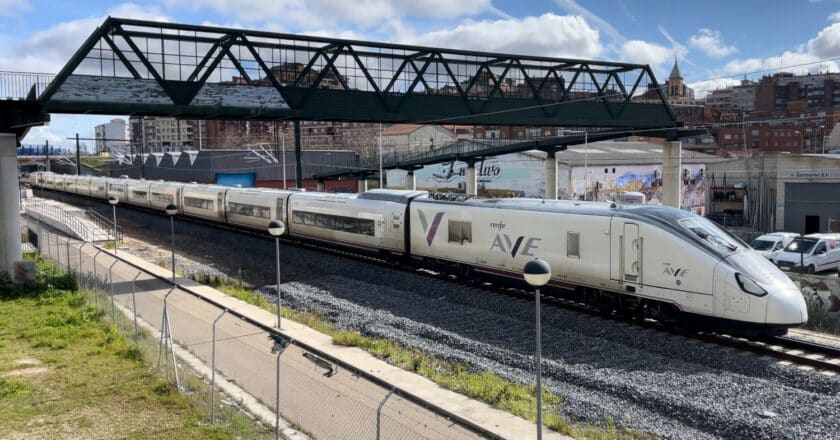The commissioning of Renfe’s 106 series trains (Talgo’s Avril family) is again delayed. Even though seven trains have been delivered, the reliability tests could be better, and the manufacturer must improve the trainsets. Renfe is considering increasing the compensation it will demand from the manufacturer by 50 million euros.
March 31st was the deadline that the Minister of Transport, Óscar Puente, had set for the Avril trains to begin commercial train operation. According to the delivery schedule agreed upon with Talgo, the operator should have received the first ten train sets by that day. The following ten trains would have to be delivered by the end of 2024, and the last 10 to be provided by the beginning of 2025.
Talgo Avril trainsets will not enter service on April 8th
According to this schedule, the long-awaited debut of Talgo’s latest generation of high-speed trains was to take place on April 8th. The sale of tickets for the destinations affected by this milestone has been blocked since that day. According to the operator, it will be unblocked until the end of the month.
Talgo, for its part, is confident that these first ten will bring the Avlo and the AVE to the heart of Asturias and Galicia before May. However, nobody dares give a definitive date, and we may have to wait until the fifth month of the year to see them in commercial service.
According to several sources, Talgo has delivered seven trainsets. Renfe has been using them for driver training and reliability tests since the beginning of January. It is precisely during the reliability tests that Renfe seems to be encountering problems.
According to El Comercio, 75% of the trips to test the trains’ reliability involved an electrical system error detecting a failure, causing the train to stop in the middle of the journey.
In addition, Renfe reportedly complained about excessive vibrations in the train. Although the AESF (Spanish Railway Security Agency) has accepted these as valid, the operator considers them a significant comfort problem for passengers.
This problem has been introduced previously. People close to the homologation process told Trainvista that it has always existed. Experts believe that the absence of primary suspension in trains with sliding tracks is the cause of these vibrations, which are challenging to solve.
The compensation requested by Renfe could amount to 166 million euros
The damages caused by the commissioning of the Avril trains are inadequate for Renfe.
On the one hand, AVE and Avlo services depend on these trains to reach Gijón and several cities in Galicia. Thanks to the 106 trains, which have a maximum speed of 330 km/h, journey times to these destinations will be significantly reduced.
On the other hand, the redistribution of rolling stock that will take place due to the release of the 130 series trains will allow cities such as Salamanca or Cádiz to recover the railway services they had before the pandemic.
Moreover, thanks to the increased capacity of these trains, Renfe will be more competitive on the Madrid-Barcelona corridor.
When the contract was signed, the Avril trains were to be put into service in May 2020, before the liberalisation of passenger transport. However, the pandemic outbreak caused an initial delay of several months until the beginning of 2021.
Since then, difficulties in the homologation tests have been delaying this date. In July 2022, Renfe announced that it would ask Talgo for 116 million euros in compensation for the damage caused by the delay.
The AESF finally obtained the series’ approval in October 2023. The trains were updated then before their delivery to the operator began.
Now, after learning that they will not be able to enter service on April 8th, El Economista has reported that the operator is threatening to increase the compensation by 50 million euros. It would finally be 166 million out of the 1,495.4 million for which Renfe awarded the contract.
Talgo says it is considering possibly paying this compensation “remotely”. According to the company, Renfe has not formalised this compensation. However, El Economista points out that experts are still assessing the impact of the delay on the company’s accounts.


